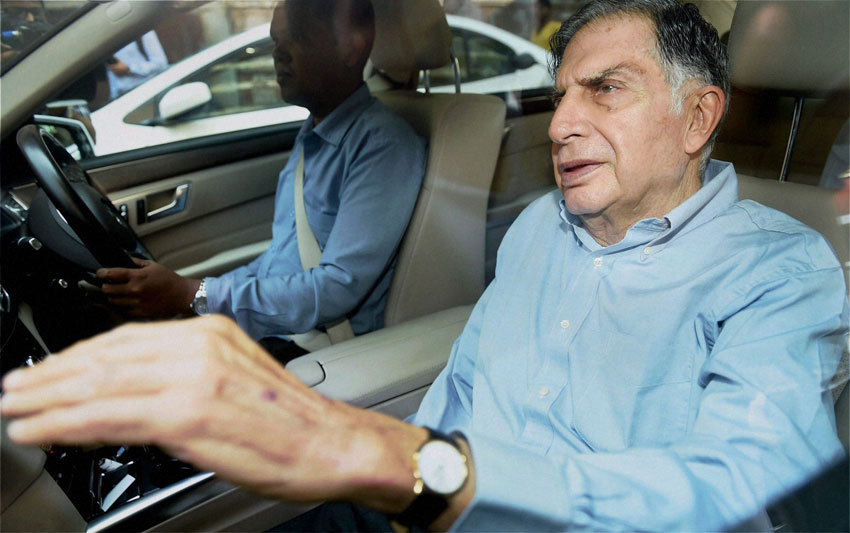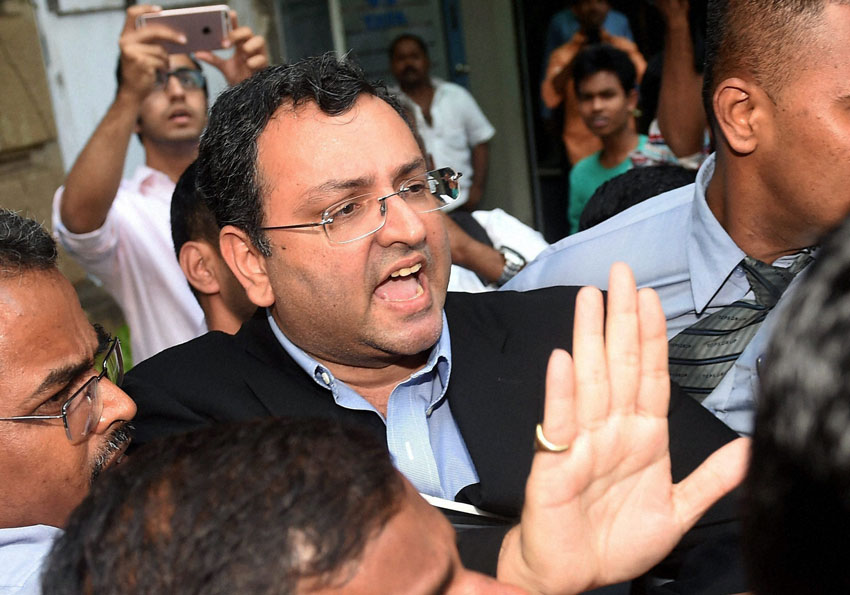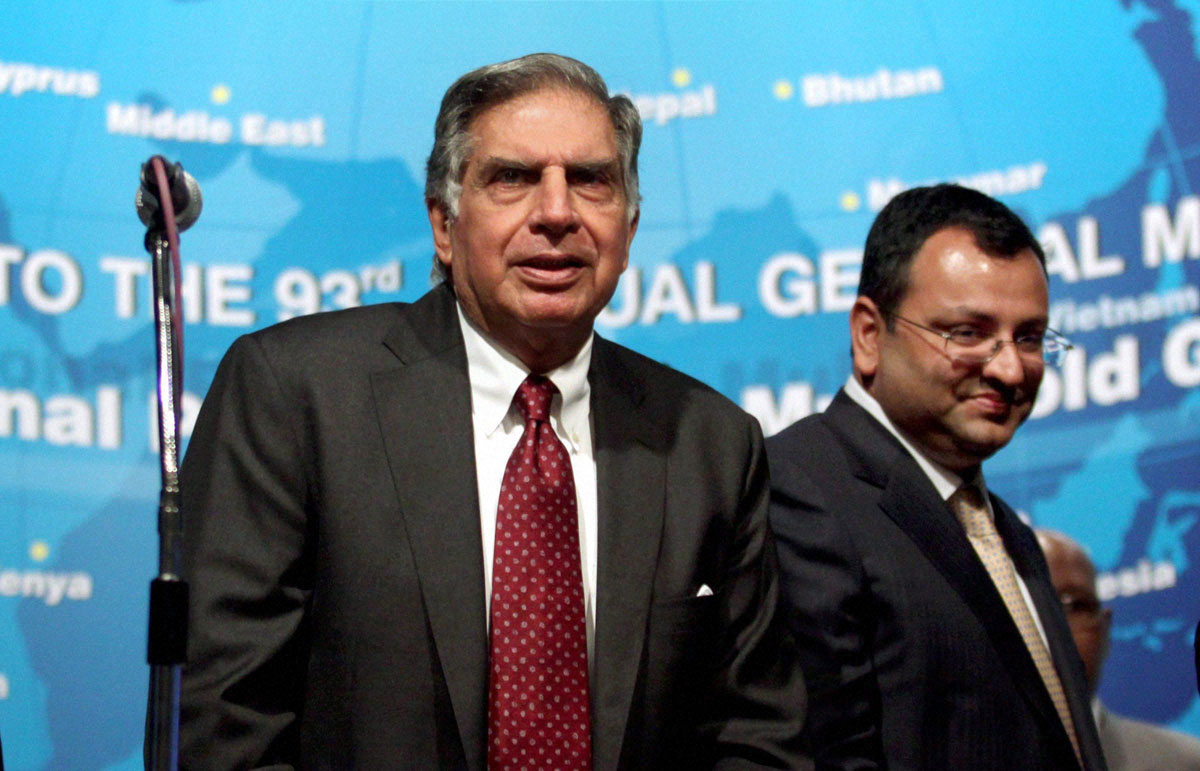THE TATA-MISTRY SAGA
File photo of Ratan Tata (l) with Cyrus Mistry. Tata Sons removed Cyrus Mistry as its Chairman, Oct. 24, nearly four years after he took over the reins of the group. Ratan Tata makes a comeback, taking over as the company’s interim boss for 4 months. (Press Trust of India)
Indian Market regulator SEBI has begun looking into the high profile Tata-Mistry case for any possible breach of corporate governance norms and listing regulations at various listed companies of the over $100 billion conglomerate. – @siliconeer #siliconeer #Tata #RatanTata #CyrusMistry
SEBI Looking into Tata-Mistry Saga as Bourses Seek Clarification
Stock exchanges sought clarification, Oct. 26, from many of Tata group’s listed companies on the purported disclosure by ousted Chairman Cyrus Mistry about Rs 1.18 lakh crore possible write-down at the group firms.
“We are taking note of each and every development and will act immediately on any hint of possible violation of corporate governance and listing norms or any other regulation under our jurisdiction,” a senior official said.
The Securities and Exchange Board of India is looking into the alleged disclosure made in the purported letter written by Mistry to Tata Sons’ board members including about financial and other irregularities as also lapses on the corporate governance front, sources said.
The stock exchanges and the regulator are also keeping a close watch on the price movement and trading activities of over two dozen listed companies of Tata group, which have seen an erosion in value in last two trading sessions after the surprise ouster of Mistry in less than four years of being made chairman of Tata Sons, the main holding company of the group.
The price movement and trading volumes for few days prior to the surprise announcement will also be looked into.
The exchanges have asked these companies, including Tata Motors, Tata Steel, Indian Hotels, Tata Teleservices and Tata Power, to provide full details about these issues.
The notices from the stock exchanges followed reports about Cyrus Mistry, who was ousted as the chairman of the group’s main holding company Tata Sons, disclosing possible writedown to the tune of $18 billion faced by the conglomerate.
The exchanges have asked the companies to provide “clarification/confirmation on the news item in detail”.
The companies have also been asked to explain “whether such event/negotiations/article stated in published news were taking place?
“If so, you are advised to provide the said information along with the sequence of events in chronological order and the material impact of this article on the company,” the exchanges said.
The companies have also been asked about “any information that has not been announced to the exchanges” as required under the Listing Regulations.
The companies were yet to respond to the exchanges.
In an explosive confidential email to Tata Sons board members, Mistry warned that the salt-to-software giant may face Rs 1.18 lakh crore in write-downs because of five unprofitable businesses he inherited.
Mistry said he inherited a debt-laden enterprise saddled with losses and went on to single out Indian Hotels Co., passenger-vehicle operations of Tata Motors, European operations of Tata Steel and part of the group’s power unit and its telecommunications subsidiary as “legacy hotspots.”

Mistry Ouster: Tata Stocks Extend Fall; Total Wipe Out Rs 21,000 Crores
Key Tata Group firms lost over Rs. 10,000 crore for the second day, Oct. 26, extending the total erosion in market capitalization to more than Rs. 21,000 crore following Cyrus Mistry’s ouster as Tata Group chairman.
These firms had lost about Rs. 10,700 crore Oct. 25.
Shares of Tata Motors dipped 4.27%, Tata Steel slumped 4.01%, Tata Power lost 2.06% and TCS fell by 0.07% on BSE, Oct. 26.
Besides, Tata Metaliks slipped 3.85%, Tata Elxsi dropped 3.15%, Tata Global Beverages (3.10%), Tata Chemicals (2.83%), Tata Communications (2.68%), Tata Sponge Iron (0.57%) and Tata Coffee (0.42%).
Tata Group overall commands market capitalization of over $125 billion (close to Rs. 8.5 lakh crores), with software giant TCS alone accounting for Rs. 4,72,301.73 crores.
In the stock market, the BSE benchmark Sensex too fell by 254.91 points to end at 27,836.51.
Mistry’s family firm Shapoorji Pallonji Group has 18.4% in Tata Sons—the holding firm of the group companies.
In the surprise development, the board of Tata Sons, where 66% shares are held by philanthropic trusts endowed by members of the Tata family, ousted Chairman Mistry, saying it was acting “for the long-term interest” of the firm.
His predecessor Ratan Tata has been made the interim chairman and a committee has been set up to look for a new head of the $100 billion conglomerate.

Mistry: I was Made a ‘Lame Duck’ Chairman
Sacked unceremoniously, a “shocked” Cyrus Mistry has leveled a series of allegations against Ratan Tata and contended that he was pushed into a position of “lame duck chairman” and changes in the decision making process created “alternate power centers” in Tata Group.
In an explosive confidential email to Tata Sons board members, he accused them of replacing him as Chairman of India’s largest conglomerate without so much as a word of explanation and without affording him an opportunity of defending himself “in a summary manner” that must be “unique in the annals of corporate history.”
“I was shocked beyond words at the happenings at the board meeting of October 24, 2016. Apart from the invalidity and illegality of the business that was conducted, I have to say that the Board of Directors has not covered itself with glory.
“To ‘replace’ your Chairman without so much as a word of explanation and without affording him an opportunity of defending himself, in a summary manner, must be unique in the annals of corporate history,” he wrote in the email, Oct. 25, which was circulated widely to the media, Oct. 26.
Attempts to get a response from Tata Sons on Mistry’s charges failed.
Mistry said he was promised a “free hand” when he was appointed chairman in December, 2012, but the Articles of Association were modified, changing the rules of engagement between the Tata family trusts and the Board of Tata Sons.
Stating that he “inherited” problems, he went on to raise corporate governance issues alleging representatives of family trusts, which hold two-thirds of Tata Sons shares, were reduced to “mere postmen” as they left board meetings midway to “obtain instructions from Mr. Tata.”
In clear signs that not all was well between him and Tata, he highlighted his predecessor’s loss-making Nano car project that consistently lost money but could not be shut down for “emotional reasons” and because it would have stopped the supply of Nano gliders to an electric car-making entity where Tata had stakes.
He alleged that it was Tata who forced the Group to foray into the aviation sector by making him a ‘fait accompli’ to joining hands with Air Asia and Singapore Airlines and making capital infusion higher than initial commitment.
Also, “ethical concerns” had been raised over certain transactions and a “recent forensic investigation revealed fraudulent transactions of Rs. 22 crore involving non-existent parties in India and Singapore,” he wrote.
He warned that the salt-to-software giant may face Rs. 1.18 lakh crores in write-downs because of five unprofitable businesses he inherited.
Defending his record, Mistry said he inherited a debt-laden enterprise “saddled with losses” and went on to single out Indian Hotels Co., passenger-vehicle operations of Tata Motors, European operations of Tata Steel and part of the group’s power unit and its telecommunications subsidiary as “legacy hotspots.”
He said the “suddenness” of the action, and the “lack of explanation” had led to all manners of speculation and had done “immeasurable” harm to his reputation as well as that of Tata Group.
“I cannot believe that I was removed on grounds of non-performance,” he said, going on to point at two directors, who voted for his removal, only recently lauding and commending his performance.


